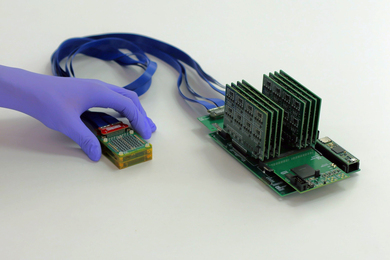The question--as posed in the title of the Independent Activities Period seminar--was "Putin's Russia: Friend or Foe?"
The answer--as seminar participants discovered on Jan. 17--may depend on the definitions of "friend" and "foe."
Whatever the definitions, exploring the "friend-foe" question is not only crucial to the United States and Russia, but also "crucial to world stability," said Carol Saivetz, a visiting scholar at MIT's Center for International Studies and the seminar leader. From the violence in the Persian Gulf to the radiation poisoning of former Russian spy Alexander V. Litvinenko in London, shifts in the relationship between the United States and Russia can have ripple effects throughout the globe.
How then, she asked, "do we measure our friendship or enmity with Russia?"
Saivetz began the seminar by reading a headline in a Russian newspaper: "Russians Sold Defensive Missiles to Iran." Rather than use that as an answer, Saivetz peeled back the layers of history that have formed Russia's foreign policy since the collapse of the Soviet Union and probed whether the United States has correctly interpreted and responded to those policies.
Saivetz, a research associate at Harvard's Davis Center for Russian and Eurasian Studies, noted that in the chaos after the Soviet collapse in the 1990s even Russians admitted, "We don't have a foreign policy." Later, Russia-watchers referred to the "Bill and Boris show," reflecting the working relationship between Bill Clinton and Boris Yeltsin.
But now, particularly with the ascension of Vladimir Putin, Russia's foreign policy has become "more opaque," leaving scholars wondering what part do such factors as ideology, domestic agendas, business interests, energy policies and national pride play. Moreover, noted Saivetz, who is writing a book on Putin's foreign policy, if democracies tend not to fight other democracies--as is conventional wisdom--then Putin's increasing curtailment of civil liberties may have an effect on U.S.-Russian relations.
However, she asked, does the United States need "friends?" Are all our allies our friends?
"Right now, friendship means sharing a mutual enemy," said Daniel L. Mokrauer-Madden, a junior majoring in math and physics. But he also said, "If we call Russia our friend, then what is our friend doing to our other friends?"
Perhaps, Saivetz suggested, Russia and the United States interpret "friendship" differently.
Certainly "security" has a different meaning today, said Peter Watkins, a fellow at the Weatherhead Center for International Affairs at Harvard University, who came to Saivetz's seminar. In the Cold War, a security threat was considered the ability to "wipe us out," he said. Now "people are developing a broader sense of security, such as economic security, energy security."
For Russians, Saivetz said, "having an empire was part of the national psyche." Today, leaders want a "seat at the table" in setting world policy, and Putin seemed willing to play by the rules of democratic nations because adherence to such policies is donning the "school tie" that makes him part of the "club" of world powers.
Recall, Saivetz said, that on Sept. 12, 2001, Putin assembled his top advisors to determine Russian policy after the terrorist attacks of Sept. 11. A majority wanted Russia to remain neutral, a few suggested supporting President Bush, and a few even recommended siding with the Taliban. Putin chose to support Bush.
Certainly, Watkins observed, Sept. 11 vindicated what Russia, beset by Chechen rebels, had been warning about Islamic terrorists.
Subsequently, however, the United States has abrogated the Anti-Ballistic Missile Treaty and invaded Iraq against the wishes of Putin. This may lead him to believe that he'll never be a member of the club and might as well shrug off democratic rule, Saivetz said.
Thus, Russia, too, is deciding whether the United States is a friend or foe.
The second half of "Russia: Friend or Foe" will be held Wednesday, Jan. 24, from 2 to 3:30 p.m. in the Center for International Studies.
A version of this article appeared in MIT Tech Talk on January 24, 2007 (download PDF).





